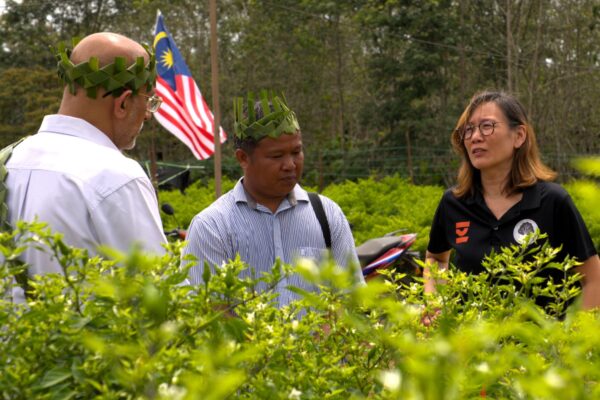From Forests to Fields: A Village in Transition
“Living near the lush forests, our livelihoods once revolved around seeking and processing timber," reminisced Edi Saroha Pandiangan, a resident of Muara Bungkal Village in Siak District, Riau Province. But as the long-term unsustainability of the timber industry became clear, Edi and others began searching for new ways to support their families—methods that could coexist with the environment rather than degrade it.

A Turning Point: Embracing Agriculture
The shift began in 2016, when the government launched a food security program. Edi ventured into farming, though early efforts yielded limited success.
"I ventured into farming, albeit with modest success," Edi recalled.
Suyatno, the village educator, highlighted the challenge of encouraging people to stay and farm locally. "The village held immense potential, but historically, its residents favoured employment opportunities beyond the village borders," he said. Logging and jobs in the provincial capital seemed more promising. Suyatno persisted—visiting households and holding meetings to advocate for change through food security program. Edi ventured into farming, though early efforts yielded limited success.

Earthworm Foundation Steps In
In 2021, Earthworm Foundation began working with the village through its Riau landscape initiative. "Earthworm sought our input as a community, asking how they could support and improve our village. Representing us, I conveyed our story and aspirations," said Edi. At the heart of our landscape-scale initiative is Participatory Land Use Planning (PLUP), a model we believe holds strong potential to regenerate nature and empower local communities. One of the key outcomes, a recommendation to form a collective farmer group.
Working Together, Growing Together
Until then, most farmers worked alone. According to Edi, this meant low and inconsistent income. "While we farmed independently, on average I only got IDR 1 to 2 million [around USD 63 to 127] per month. Working together as a collective proved to be better," he said.
Since forming the Muara Agro Lestari (MAL) farmer business unit, Edi and his fellow farmers report cultivating a shared area of approximately 5.5 hectares. They now grow chilli, shallots, cucumbers, and corn. Community accounts from the end of 2023 cite peak chilli yields of 7.3 tonnes per hectare.
Today, 21 farmers participate in managing the fields, with reported monthly incomes ranging from IDR 2.5 to 3.3 million [USD 159–210].
Empowering Women Along the Way
In early 2023, Rahma Deliza—known as Liza—joined the group. Formerly a housewife dependent on her husband’s unstable income, she welcomed the change.
“I am grateful to be able to work here. I can get additional income to buy our daily needs. When the business is successful, we the women and mothers also benefit from it,” she shared.

Support Beyond Seeds and Soil
Earthworm’s support extends beyond technical advice. Our team offers training on good agricultural practices—from soil preparation and crop scheduling to post-harvest processing and market linkage. We also help the community map local resources and submit funding proposals.
A key partner in this journey is the Siak District Agriculture Office, which designated 10 hectares of land for food security and provides inputs like shallot seeds to help ensure success.
Community Collaboration and Government Partnership
Rozikin, Earthworm's Livelihood Coordinator for the Riau Landscape, highlighted the impact of this public-private effort.
"Over five planting cycles since 2022, farmers have focused on cultivating shallots across this allocated area. We hope the continuous support from and collaboration among stakeholders will result in a better life for the communities in Muara Bungkal Village," he said.

Setbacks and Shared Resilience
Despite their progress, the journey hasn’t been without challenges. At the end of 2023, just 10 days before harvest, community members report that floods wiped out the farmers' crops—resulting in estimated losses of up to IDR 500 million.
"In farming, we coexist with nature and pests, and many obstacles arise. But because we farm in groups, we share the joys and sorrows together, so the burden is not borne alone. Our spirits never die, even in the face of setbacks. Now, we have to start again, little by little," said Edi.
Earthworm has continued to stand by the community through this period, helping them recover and rebuild.
Looking Ahead
"We are so grateful to Earthworm Foundation for the support we've received so far. We hope that in the future, Earthworm can continue to support and assist us so that the 225 hectares of land available in this village can be managed effectively, gradually, and sustainably. Additionally, we hope Earthworm can help us establish connections with the government and companies in this area to improve the local economy," Edi added.
A Model for Regeneration
This work in Riau is not just about chili or farming. Earthworm has maintained a strong presence on the ground in Riau for over a decade. Our work goes beyond chili farming or peatland protection , it's about driving lasting change across the landscape.
In Riau, Earthworm leads a landscape-scale initiative that connects supply chains with production regions. Acting as a hub for collective action, this approach enables scalable regeneration and tackles key sustainability challenges at their root. The Riau iniative is funded by APRIL, Colgate, Givaudan, LVMH, Nestle, PZ Cussons, Reckitt, Target, Walmart Foundation.


